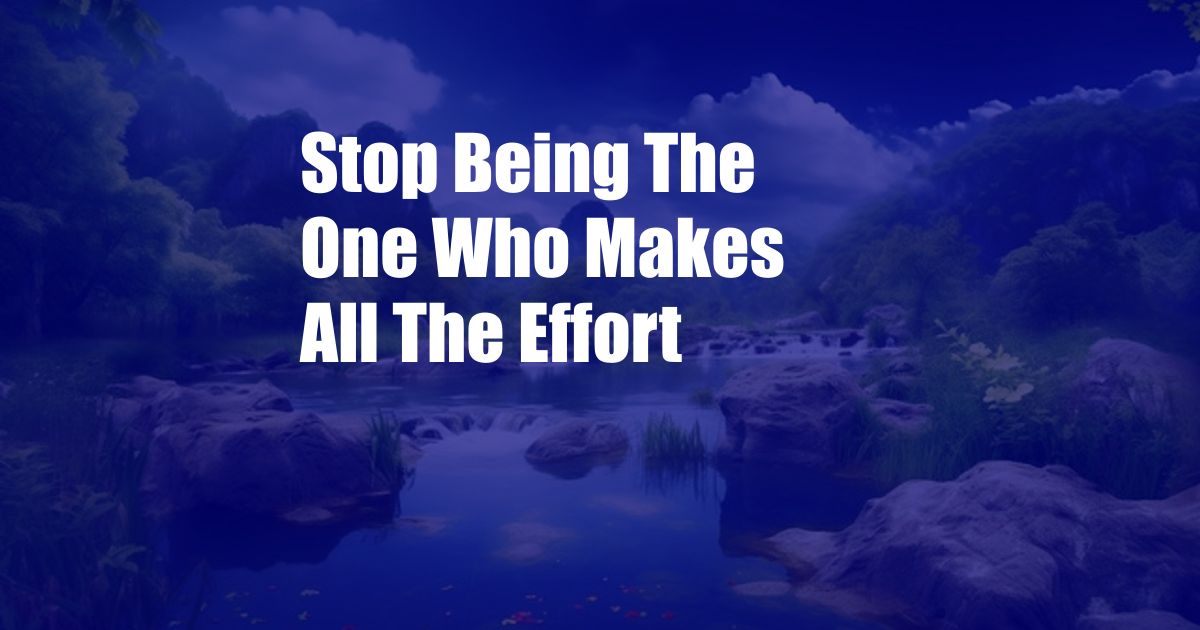
Stop Being the One Who Always Makes All the Effort
Are you tired of feeling like you’re the only one putting in the effort in your relationships? Whether it’s with friends, family, or romantic partners, it can be frustrating when you feel like you’re the one who is always reaching out, making plans, and keeping the conversation going. While it’s important to be supportive and present in relationships, it’s equally crucial to ensure that the effort is balanced and that your own needs are being met.
The Unfair Burden of Unilateral Effort
When one person consistently makes all the effort in a relationship, it creates an unfair burden on that individual. They may feel overwhelmed, taken advantage of, and resentful. Over time, this imbalance can erode the relationship and lead to feelings of dissatisfaction and distance. Additionally, constantly putting in effort can lead to feelings of burnout and emotional exhaustion.
Understanding the Causes
There are several reasons why one person may end up consistently making more effort in a relationship. Some possible causes include:
- Low self-esteem: Individuals with low self-esteem may feel they need to constantly prove their worth and value to others, leading to excessive effort in relationships.
- Fear of abandonment: People who fear abandonment may go to great lengths to avoid losing loved ones, resulting in unbalanced effort patterns.
- Relationship dynamics: The nature of the relationship can also influence effort levels. For instance, in romantic relationships, one partner may assume a traditionally more “caretaker” role, which can lead to an imbalance of effort.
Breaking the Cycle of Unfair Effort
If you find yourself constantly making more effort than your partner, it’s important to break the cycle and create a healthier dynamic. Here are some tips:
- Communicate your needs: Express your expectations clearly and directly with your partner. Let them know that you value their effort and that you would like it to be more balanced.
- Set boundaries: Establish clear boundaries around your time and energy. Learn to say “no” when you’re unable or unwilling to put in additional effort.
- Practice self-care: Make time for activities that nourish and fulfill you. When you take care of yourself, you’re less likely to feel resentment when your partner doesn’t reciprocate your efforts.
- Encourage your partner: Positive reinforcement can encourage your partner to contribute more effort. Express appreciation when they make an effort and provide constructive feedback to help them understand your needs.
Expert Advice on Balanced Effort
Numerous experts in the field of relationships offer valuable insights on the importance of balanced effort. Dr. Gary Chapman, author of “The Five Love Languages,” emphasizes the significance of understanding each other’s needs and expressing love in ways that are meaningful to both partners. Dr. John Gottman, founder of the Gottman Institute, stresses the importance of creating a “bids for connection” system, where partners regularly initiate positive interactions with each other.
Frequently Asked Questions
Q: Is it always wrong for one person to make more effort in a relationship?
A: Not necessarily. In some cases, one partner may naturally have a more nurturing or assertive personality, leading to a slightly unbalanced effort pattern. However, it’s important to ensure that the effort is not consistently one-sided and that the other partner is also actively contributing to the relationship.
Q: What should I do if my partner doesn’t respond well to my requests for more effort?
A: It’s important to have patience and approach the conversation with empathy. Try to understand their perspective and work together to find a solution that works for both of you. If they are unwilling or unable to make changes, it may be necessary to reconsider the relationship.
Conclusion
Balancing effort in relationships is essential for long-term happiness and satisfaction. By understanding the causes of unfair effort patterns, communicating needs, setting boundaries, practicing self-care, and encouraging your partner, you can break the cycle and create a more equitable dynamic. Remember, healthy relationships are built on mutual support, respect, and a fair distribution of effort.
If you find yourself consistently making all the effort in your relationships, it’s time to take action. By prioritizing your needs and working towards a more balanced effort pattern, you can improve your overall relationship satisfaction and well-being.
Are you interested in learning more about creating a balanced and fulfilling relationship dynamic?